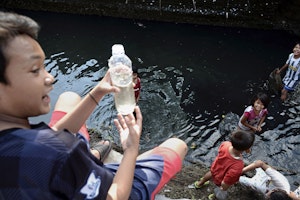A Kyrgyz Wikipedia
By Chorobek Saadanbekov
Most English speakers wouldn’t be able to imagine life without Wikipedia. The free online encyclopedia that anyone can edit has become the quickest way to look up information on just about anything. But for speakers of other languages access to knowledge via Wikipedia has not always kept pace.
Take for example Kyrgyz. There are just over five million speakers of the language, most of whom are located in Kyrgyzstan with others speakers scattered about China, Uzbekistan, and Tajikistan. Kyrgyz and Russian are the official languages of Kyrgyzstan, however, more than two million citizens in the small Central Asia nation only speak one of the languages—Kyrgyz. Meanwhile, Russian is the primary language for higher education, science, and the media.
Most schools provide instruction in Kyrgyz, but there is a real shortage of Kyrgyz textbooks. The Ministry of Education recently announced that schools are in need of 12 million textbooks—a great expense given the country’s current financial situation. This is where Wikipedia comes in. Although it is a substantial resource in Russian, entries in Kyrgyz are limited. The Open Society foundation in Kyrgyzstan is working to change this.
Building a Kyrgyz Wikipedia is a priority for the local foundation which attracted more than 10 universities, 30 academics, about 300 students from across the country to form a working group on the topic. The foundation started this project in March 2011 by holding a “Week of Wikipedia” at five universities. Each university committed to producing 500 articles in the first half of the year in exchange for Wi-Fi installation on their campuses. The universities organized student clubs for Wikipedians, and members were given special training on the rules for creating entries.
The program has been a huge success. Indeed, the number of articles in the Kyrgyz Wikipedia has grown rapidly since then: in the March 2011 when the project began there were only 1,300 entries. That number more than tripled by the end of that year and today the Kyrgyz Wikipedia has 23,000 entries.
New entries have focused on the great Kyrgyz writer Chyngyz Aitmatov and the epic poet of Manas, but the Kyrgyz Wikipedia also contains information on a wide variety of subjects: from geography and biology to biographies and folklore. Even the Real Madrid football team has an entry.
This past December the Second Republican Rally of Kyrgyz Wikipedians took a place in Cholpon-Ata, Issyk-Kul region. The rally brought together the best Wikipedians from all over the country to look back on their progress, discuss questions, draft a management plan, and train new Wikipedians on how to improve the quality of articles on the site.
As the number of articles grows, so too do the demands on the quality of the information provided. Thanks to a partnership with the Kyrgyz National Encyclopedia, new entries based on materials from the national encyclopedia is growing. The demand for content in Kyrgyz is obvious. In October 2012 alone the site had 593,000 views. It is further encouraging that the project has been supported by private companies as well. The leading mobile operator Beeline handed out awards for participants who made the greatest contribution to Wikipedia last year.
The foundation will keep working on the development of the Kyrgyz Wikipedia. Our plan is to increase the number of articles over the next two years to 100,000. We also hope to involve more educational institutions and universities in the joint development and use of the Kyrgyz Wikipedia, and draw attention to the lack of qualitative content in Kyrgyz.
The success of the Kyrgyz Wikipedia will ultimately require widespread involvement from the community. Wikipedia is a living organism, and it needs content to survive. It has the potential to make a significant contribution to both the Kyrgyz internet and also the Kyrgyz language. The project helps Wikipedians gain new experience and creates a new, huge, and free knowledge base for all Kyrgyz speakers in the country and beyond.
Chorobek Saadanbekov is project coordinator of the Movement of Kyrgyz Wikipedians.


